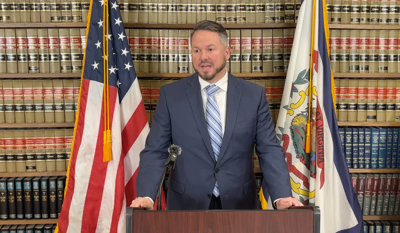CHARLESTON, W.Va. (WV News) — West Virginia First Foundation on Monday approved a $20 million funding commitment for a data-driven multi-county addiction recovery project.
The Appalachian Continuum of Care for Overdose Reduction Network initiative is designed to implement a comprehensive system of care, according to a press release from the foundation.
The foundation’s funding will be used to conduct needs assessments to identify gaps in existing services, develop and implement tailored response plans, expand wrap-around services, counseling and housing assistance and track and measure progress through data-driven analysis of overdose rates.
The project will initially be implemented in Boone, Cabell, Fayette, Kanawha, Lincoln, Logan, Mason, Putnam, Raleigh, and Wayne counties.
These counties, covering a population of more than 585,000, were selected based on their high rates of overdose and significant need for comprehensive interventions.
“Through WVFF’s funding, this initiative will not only initially address critical needs in 10 counties, nearly one-third of the population of the state of West Virginia, but also generate a statewide needs assessment,” said Jonathan Board, WVFF executive director. “This data will give us a clearer picture of where resources are most needed, allowing for strategic planning that benefits all West Virginians.
“By focusing on outcomes and scalability, we’re setting a precedent for impactful, data-driven solutions.”
While the focus begins with these 10 counties, the ultimate goal is to develop a scalable, outcomes-based model that can be replicated across West Virginia and beyond.
“This innovative approach to addiction prevention and recovery is the first of its kind, bringing together evidence-based strategies and community collaboration in a way that has never been done before,” said Matthew Harvey, WVFF board chairman. “By investing in ACCORN, we are setting a national precedent, demonstrating how focused, strategic funding can create a sustainable impact and serve as a model for addressing the opioid crisis nationwide.”
Funding for years two and three will be contingent on the project meeting its first-year objectives, ensuring accountability and a clear return on investment for the state’s communities, according to the release.
Those objectives, as outlined by the foundation, are:
• A reduction in the number of infants in the target region diagnosed with neonatal abstinence syndrome and/or born exposed to illicit opioids. For continued funding, there must be a 10% reduction in the first quarter of year two, compared to the first quarter of year one, and a 15% reduction in Q1 year three compared to Q1 year one.
• A reduction of the rate of recidivism among program participants compared to the national average. The program must see a rate of no less than 3% below average in the first year of funding and no less than 5% in the second year.
• Regular drug testing, with no more than 25% of results returning positive and at least 75% returning negative for all substances. Tests will screen for methamphetamine, cocaine, alcohol, THC, fentanyl, benzos and opiates. A minimum of two screenings per month must be provided to all participants.
• The expectation is that this project be expanded to three additional counties each in year two (Mingo, McDowell, Wyoming) and year three (Mercer, Summers, Monroe).
In addition, the First Foundation will offer a statewide needs assessment to ACCORN as an in-kind donation by Q4 of year 1.
Updates on the project’s progress and federal review will be shared in early 2025.
The ACCORN project, in collaboration with local and national partners, is part of the ARPA-H HEROES program, a federal initiative that ties funding to measurable outcomes in addressing critical health challenges.
With an initial $15 million investment from ARPA-H, the program challenges community stakeholders to contribute the next $30 million, ensuring long-term sustainability and enhanced community impact.
While WVFF’s $20 million commitment marks a significant step forward, the next phase involves submitting a formal application to the federal government for approval and funding. Final decisions are expected in early 2025.



Post a comment as Anonymous Commenter
Report
Watch this discussion.
(0) comments
Welcome to the discussion.
Log In
Keep it Clean. Please avoid obscene, vulgar, lewd, racist or sexually-oriented language.
PLEASE TURN OFF YOUR CAPS LOCK.
Don't Threaten. Threats of harming another person will not be tolerated.
Be Truthful. Don't knowingly lie about anyone or anything.
Be Nice. No racism, sexism or any sort of -ism that is degrading to another person.
Be Proactive. Use the 'Report' link on each comment to let us know of abusive posts.
Share with Us. We'd love to hear eyewitness accounts, the history behind an article.